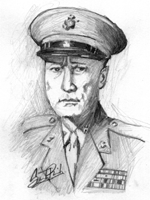Courtesy of the Marine Corps Gazette:
Colonel John J. Gormley (1914-1995)
by Benis M. Frank

Lieutenant Gormley’s first assignment was to the 6th Marines in San Diego, followed by a series of other details to sea and shore duty. In February 1942 he took command of the detachment on the Colorado, which participated in the Tarawa operation. The 3-day prelanding bombardment, which began on 17 November 1943, marked the beginning of the Central Pacific Offensive. In June 1944, after completing Senior School at Quantico, he once more headed for the Pacific, this time to join the 1st Marine Division on Pavuvu, in the Solomon Islands northwest of Guadalcanal, where he was given command of the 1st Battalion, 7th Marines (1/7).
On 15 September 1944, the 1st Marine Division assaulted the beaches of Peleliu, with the 7th Marines landing on the right flank of the division beachhead, in a column of battalions—3/7 leading with 1/7 in its tracks. The mission of the 7th Marines was to isolate and reduce Japanese defenses in the southern end of the island. Upon hitting Orange Beach on the regiment’s right flank, 1/7 attacked south and to the southeast against well-prepared enemy positions. On D+1, Lieutenant Colonel Gormley led his battalion in the continued southerly drive, and by noon had reached the southeastern beaches of Peleliu facing Ngarmoked Island. By D+3, the 7th Marines had complete control of southern Peleliu and joined the attack on the Umurbrogol Mountain.
Two days after the 7th Marines reported its initial mission on Peleliu completed, 1/7 relieved the battered Marines of 1/1 and 2/1 in the frontline positions at the foot of the Umurbrogol. Here, Gormley’s Marines encountered the challenge of destroying the enemy in the canyons, heights, and caves as had the 1st Marines before them. Although Army units began arriving on 22 September, for 1/7 the end was not in sight. It continued to participate in a series of attacks against the Umurbrogol Pocket, helping to reduce it to an area of approximately 400 x 500 yards, before being relieved on the 17th of October and departing Peleliu on the 22d. Lieutenant Colonel Gormley was awarded the Legion of Merit with Combat “V” for these actions.
He led his battalion in his second and the 1st Marine Division’s last amphibious assault in the Pacific War. This time it was Okinawa, where the Tenth Army landed on 1 April 1945 against little or no Japanese opposition. The mission of III Amphibious Corps’ 1st Marine Division was to push straight across the waist of the island to cut it into two, while the 6th Marine Division headed north. The 7th Marines wasn’t lulled into thinking that taking Okinawa would be a cinch, for before long, the battalions encountered small bands of guerrillas and infiltrators. On 19 April, Army units in XXIV Corps driving south hit the first of the Japanese defenses encircling Shuri Castle, headquarters of the enemy’s
Thirty-Second Army. The Americans suffered heavy casualties, necessitating the insertion of the 1st Marine Division on 27 April, and then several days later the rest of III Amphibious Corps into XXIV Corps lines. As difficult as the fighting on Peleliu had been, 1st Division Marines were to find the drive south on Okinawa to be equally, if not more, furious and deadly. LtCol Gormley’s Marines were to attack such ferociously
and well-defended places as Wana Draw and Dakeshi and Kunishi Ridges.
In one of the very few night attacks conducted by Marines in World War II, the 1st and 2d Battalions of the 7th Marines surprised the enemy by capturing the crest of Kunishi Ridge with negligible casualties. At H-hour minus 1 (0230), 12 June, rifle companies of both 1/7 and 2/7 were poised to attack Kunishi Ridge with one company leading the assault. When reinforcing companies moved out and reached the ridge, they found that it had already been taken. The attack achieved complete surprise, with several small enemy groups caught in the act of preparing breakfast. For his “conspicuous gallantry and intrepidity” in these actions, Lieutenant Colonel Gormley was awarded the Silver Star Medal.
Shortly after the end of the war, 1/7, together with the rest of the 1st Marine Division, headed for North China to accept the surrender of Japanese forces there. LtCol Gormley remained in China until leaving for home in February 1946. His postwar assignments consisted of duty at Parris Island; command of the 3d and 9th Marines; attendance at the NATO Defense College, and assignments to the U. N. Military Staff Committee; and as chief of staff of the 2d Marine Division. His last assignment before retiring in 1963 was as G-3 at HQMC.
Colonel Gormley died 26 April 1995 and was buried with full military honors in Arlington Memorial Cemetery.
Michael Robert Patterson was born in Arlington and is the son of a former officer of the US Army. So it was no wonder that sooner or later his interests drew him to American history and especially to American military history. Many of his articles can be found on renowned portals like the New York Times, Washingtonpost or Wikipedia.
Reviewed by: Michael Howard
